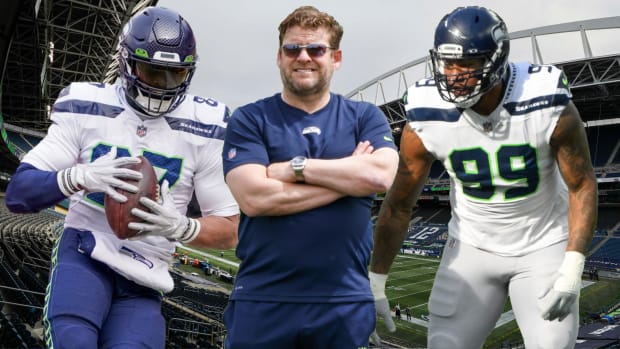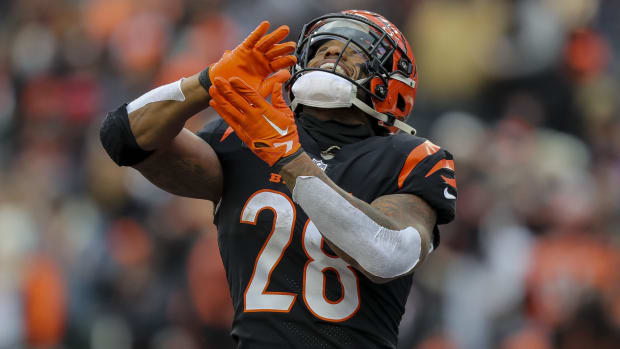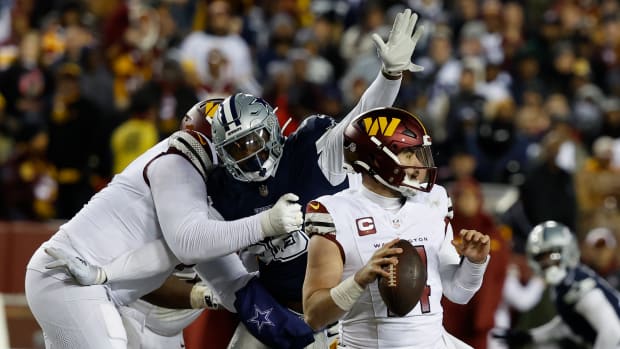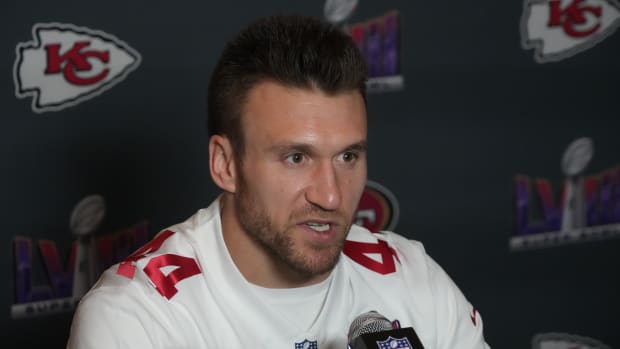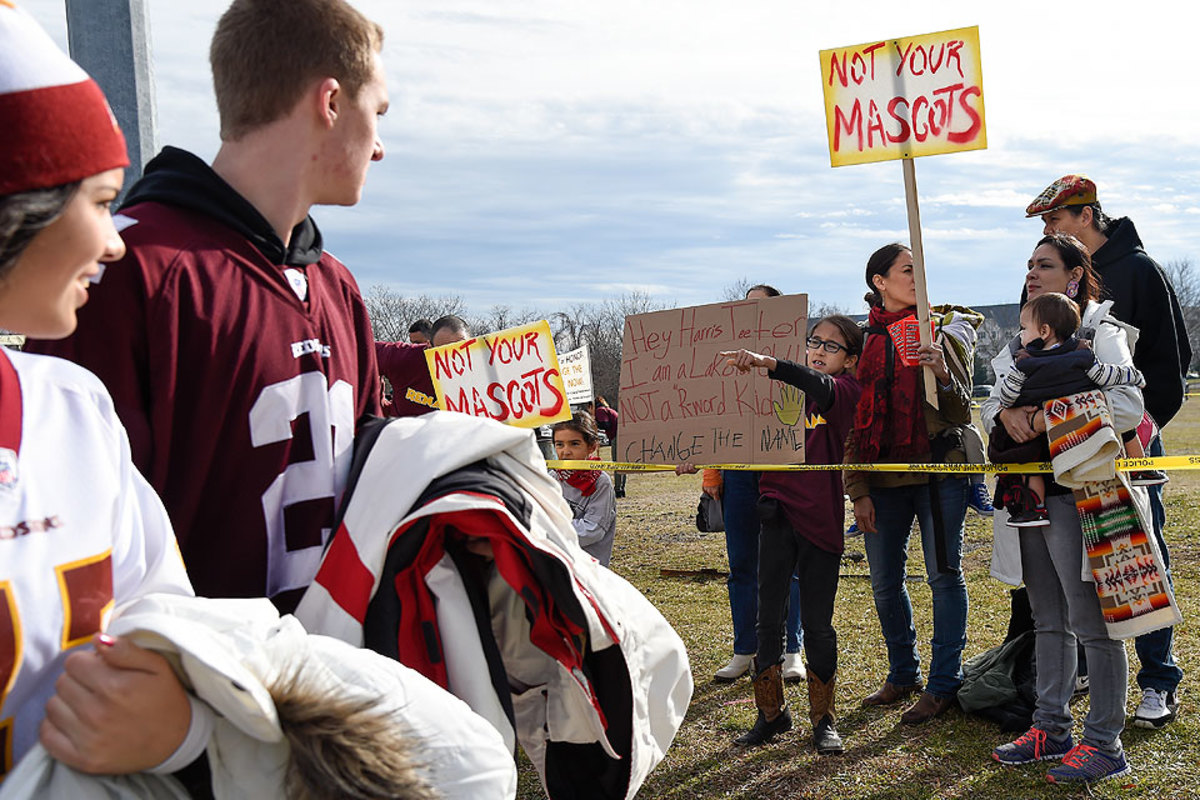
Redskins: Right or Wrong?
LANDOVER, Md. — Ian Washburn is a white, 37-year-old real estate broker, wears burgundy and gold, and spends his Sundays agonizing over the misfortunes of Washington’s football team. Tara Houska is Native American (specifically, Couchiching), a University of Minnesota grad and an attorney who couldn’t care less about Washburn and Washington’s favorite sport. What on earth were these two doing together at FedEx Field on Sunday, on the same side of a picket line no less?
“I’ve loved the team my whole life, but a couple of years ago I had to be honest with myself. It’s disrespectful imagery, and we have to let go of it," Washburn said, finishing off his message to over 150 protesters with a plea to team owner Dan Snyder, “Plus, I went to Oregon, so I know what a success re-branding can be.”
Washburn, a D.C. bro all grown up, stepped down from the bed of a black Dodge pickup truck and handed over the microphone. Soon, it was the attorney’s turn to speak as Redskins fans rubbernecked on their way to the stadium.
“I’m an attorney, and I’m also a lobbyist for tribes, and you wouldn’t believe how many people think we don’t exist anymore, extinct, or we live in teepees and paint our faces," Houska says, “And one of the reasons is the way we’re reduced to harmful caricatures like this one, mascots. Our culture is beautiful, it’s not a costume you should be able to buy at Target."
Washburn nodded forcefully. A few feet away, a large man in an authentic Redskins jersey screamed, “Go the f--- home!” within earshot of a six-year-old holding a sign. Plainclothes cops and muscled native men in leather vests kept a perimeter to prevent violence.
Together we make football!
* * *
The largest anti-nickname protest was held before the Week 17 finale outside FedEx Field. (Toni L. Sandys/Getty Images)
Actually, this isn’t what the league wants. It just can’t be. Led in part by Houska, members of nine different Native American-related organizations and sympathizing groups marched on FedEx, or rather, as close as they could get without encroaching on Dan Snyder’s property.
Snyder has in recent years launched myriad public relations efforts to dismiss dissenters, including increased donations to Native American tribes and social media efforts to downplay the level of resistance to the name among Native Americans. The team has often touted a 2004 poll of 768 Native Americans showing 90% indifference or approval of the name. Yet a 2014 Cal State study reports 67% of Native Americans find the Washington name and imagery racist.
Protestor Joe Brown of Washington got lost headed to the Sunday gathering prior to the regular season finale against the Cowboys and was instructed by Prince George's County Police he wasn’t allowed to carry his sign—‘Change the name and the curse will be lifted’—on stadium grounds. For his safety, they said, he needed to join the group just up the street behind the yellow police tape. In 2005 when Amanda Blackhorse led a protest in Kansas City, she and her companions had beer poured on them.
“And this,” Houska reminds me, “is over the name of a football team.”
This time around, for the largest ever protest of the name at a home game, Houska asked the police to suggest a suitable location, and the cops pointed them to the Jericho City of Praise church, a predominantly black mega-church just east of the stadium. City of Praise typically uses a nearby lot for cash parking on Sundays, but offered up the spot for free to protesters.
“They don’t have a position on the name,” Houska says, “but they respected our first amendment rights.”
Houska was part of a Daily Show panel of Native Americans who were interviewed, then pitted in a surprise debate with staunch name supporters on the show. In an un-aired segment, several of her fellow co-panelists who were part of a comedy troupe joined a Daily Show correspondent for a trip around the stadium lots which was meant to be funny. Wearing T-shirts aligned with their cause, they were threatened with cutting or blows by several fans. The segment was too ugly to air.
On this Sunday, the ugliness went both ways.
Most fans ignored the activists as they stood in the sectioned-off grass, or silently shot camera phone videos as they marched near the perimeter of the stadium. Some fans screamed expletives at the protestors. One man, Mike Cotterell, was approached by two plainclothes officers after screaming expletives in the face of a woman and child. He gave his name to The MMQB and agreed to an interview against the advice of a female companion who also shouted expletives at activists.
“The name’s been the same since 1932 and these people are now trying to change something that’s existed all these years?” Cotterell said. “Why now?”
• THE BATTLE OF WASHINGTON: Daniel Snyder says it honors the heritage of Native Americans; critics consider it nothing less than a racist slur. The MMQB's Jenny Vrentas set out to gauge the real sentiment regarding the name ‘Redskins’ among Native American leaders and in grass-roots tribal communities around the country. The short answer: It’s complicated
Behind the police tape, there was disagreement over how to spread the message. Despite being instructed not to engage with fans, some challenged passerby and joined in shouting matches. Many focused on black fans who they believed ought to sympathize with the cause.
A female activist brought a rainbow-colored novelty headdress and adorned her clothes with Redskins, Seminoles, and Cleveland Indians mascot faces in an effort to be ironic. When she held onto her headdress despite organizers’ pleas to throw it away, a heavyset man wearing the leather vest of the American Indian Movement snatched it from her and emphatically dumped it in a nearby trash can.
“It’s okay,” she told a male companion who motioned to stop the man. “It doesn’t matter.”
* * *
2014 Year in Review
The 2014 MMQB awardsThe NFL season through the eyes of SI photographersHow all 32 teams finished compared to preseason predictionsThe NFL’s best and worst business decisions of 2014Amid NFL turmoil, 2014 was a good year for the BillsThe best—and worst—from NFL media in 2014.
Watching all of it—a morning of bitterness preceding an afternoon of bad football—you can't help but wonder what good any of it did. Are we one step closer to resolution because a couple hundred men, women and children made pregame festivities uncomfortable for a few hundred fans?
There were powerful and entertaining testimonies to go around. Former NHL center Henry Boucha, a Chippewa, stood before protesters and described ‘redskin’ as a term used to describe the native scalps used for proof of kill by American bounty hunters in order to collect reward from local governments. Renowned civil rights activist Dick Gregory mused, “I was hoping my Native brothers and sisters would buy the team with that casino money and rename it the Washington N---ers, then see how black people feel.”
And yet the comment most pertinent to the actual discontinuation of the name came from Washburn, when he alluded, somewhat awkwardly, to the potential for a successful rebranding. Make no mistake, in the eyes of those decision-makers who have stood by the name for this long—Snyder, Roger Goodell, and the other 31 owners—this is about money. Boucha says the activist organizations are making headway in getting businesses to refuse partnerships with teams using native imagery, but none of those businesses are FedEx, Coors Light, Gatorade or Nike. Dan Snyder’s pledge to “never” change the name might as well have come with an asterisk: *unless the other owners decide the name hurts our collective earning power.
It was the “never” comment, back in 2013, which sent Washburn over the edge. He was already browsing custom stitching operations online for ways to replace the native references on his jerseys and scarves and jackets with ‘Washington,’ or simply ‘DC.’
“I was sitting at a Nats game and I saw it on Facebook,” Washburn says. “I’m thinking, ‘What is this guy doing?’ That sent me into turbo mode.”
Washburn took his feelings on the name to his favorite message board, the team-sponsored ExtremeSkins.com. Replies to his post numbered more than 10,000, with a majority of fans expressing animosity and accusing him of trolling. Eventually, the Washington Post profiled him in November and he stopped attending home games out of a combined fear for his safety and dissatisfaction with the team's performance.
“I’m not marching for civil rights in the sixties,” he says. “This is very small in comparison, but it’s something I do care very much about because I’m a fan of the team.”
Members of the same message board and a popular Washington tailgate hosted a charity event Sunday originally labeled “Scalp Out Cancer: Because Bald is Beautiful.”
Organizers Chris and Christie Lopez and Mike Kennedy changed the offending verb to “shave” after the Post reported on it, but the Post’s John Cox reported Sunday that Kennedy was still selling beanies reading “scalp out cancer.”
“Kennedy said there was no malicious intent with the name,” Washburn says. “I’ve known them for a long time, so it’s hard, but I think they’re suffering from ignorance. At the same time I think they’re getting it because they actually decided to change the name.”
Will Snyder ever follow suit?
Washburn may have stopped showing up, but 80,000 people still made it out to Landover to watch Snyder’s 4-11 team get trounced by a division rival, 44-17. A few hundred yards away, a cottage industry arose from the frustration Redskins fans were feeling as they passed Houska, Washburn and co. in the grass lot. A man who would only identify himself as being “from the city” sold $5 t-shirts with a Redskins emblem outlined around the words, “Never Gone Change.”
Follow The MMQB on Facebook, Twitter and Instagram.
[widget widget_name="SI Newsletter Widget”]









































